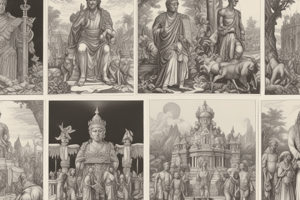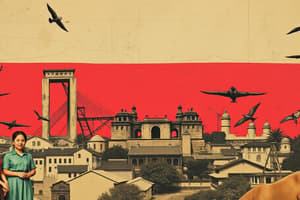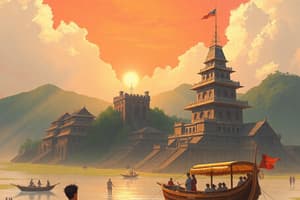Podcast
Questions and Answers
According to Candelaria et al. (2018), history is a 'Knowledge that acquired through ______ and investigation.'
According to Candelaria et al. (2018), history is a 'Knowledge that acquired through ______ and investigation.'
inquiry
Barraclough (1955) describes history as 'The attempt to discover, on the basis of Fragmentary evidence, the significant things about ______.'
Barraclough (1955) describes history as 'The attempt to discover, on the basis of Fragmentary evidence, the significant things about ______.'
us
History is ______ by nature, meaning it is incomplete and often based on limited sources.
History is ______ by nature, meaning it is incomplete and often based on limited sources.
fragmentary
One perspective in the theories of history is the ______ view, which suggests every event has a starting point, a climax, and then a downfall.
One perspective in the theories of history is the ______ view, which suggests every event has a starting point, a climax, and then a downfall.
The ______ theory posits that dominant personalities determine the course of history.
The ______ theory posits that dominant personalities determine the course of history.
History contributes to moral understanding by helping us assess ______ and interpretation.
History contributes to moral understanding by helping us assess ______ and interpretation.
Historians conduct field research, evaluate historical ______, and provide insights into past events.
Historians conduct field research, evaluate historical ______, and provide insights into past events.
One function of history is to provide a sense of ______ to individuals and societies.
One function of history is to provide a sense of ______ to individuals and societies.
What is the Greek word for history?
What is the Greek word for history?
According to Candelaria et al. (2018), how is history defined?
According to Candelaria et al. (2018), how is history defined?
Which of the following is NOT one of the types of history mentioned?
Which of the following is NOT one of the types of history mentioned?
History is static and does not change over time.
History is static and does not change over time.
Name one theory of history mentioned in the document.
Name one theory of history mentioned in the document.
Which historian process involves collecting and analyzing evidence?
Which historian process involves collecting and analyzing evidence?
What is considered a primary source?
What is considered a primary source?
According to Shafer (1980), history is a field of study that has developed a set of ______ and concepts.
According to Shafer (1980), history is a field of study that has developed a set of ______ and concepts.
Match the following types of historical sources with their examples:
Match the following types of historical sources with their examples:
What are repositories of primary sources?
What are repositories of primary sources?
Flashcards are hidden until you start studying
Study Notes
Defining History
- Origin: The term "Historia" is derived from Greek.
- Candelaria et al. (2018): Defines history as knowledge gained through inquiry and investigation.
- Shafer (1980): Describes history as a field of study with established methods and concepts.
- Barraclough (1955): Views history as the pursuit of significant insights based on fragmentary evidence.
- Zeus Salazar: Highlights "Mga SALAYSAY na may SAYSAY," incorporating stories, meanings, and importance.
- Ambet Ocampo: Emphasizes that history can be conveyed through written, visual, and oral formats.
Nature of History
- Human Actions: History focuses on actions of individuals and societies from the past.
- Fragmentary Nature: History relies on incomplete evidence.
- Ties to the Present: Historical events have implications that reach into contemporary times.
- Dynamic Discipline: History evolves with new discoveries and reinterpretations.
- Evidence: Essential for substantiating historical claims.
Types of History
- By Time/Period: Divided into Ancient, Medieval, and Modern eras.
- By Geography: Can pertain to national or local histories.
- By Special Interest: Covers political, social, and cultural dimensions.
Roles in History
- Historian: Engages in research and evaluation of historical documents to provide insights.
- History Teacher: Enhances students' understanding of history through varied instructional methods.
Theories of History
- Great God Theory: Myths as narratives in preliterate societies.
- Great Mind Theory: Ideals that propel history forward.
- Great Man Theory: Influential personalities shape historical events.
- Best People Theory: Elite groups or races considered the primary makers of history.
- Human Nature Theory: Events determined by the inherent qualities of human nature.
- Cyclical View: Historical events follow a repetitive pattern of rise and fall.
- Everyman View: Chronicles the experiences of ordinary individuals.
- Linear View: Illustrates continuity and connections between past and present.
Relevance and Skills
- Understanding societies: History provides insights into people and their interactions.
- Moral Understanding: Contributes to ethical perspectives and societal values.
- Identity Formation: Helps individuals and groups define their identities.
- Evidence Assessment: Develops skills in evaluating historical evidence.
- Conflict Interpretation: Aids in understanding diverse interpretations of historical events.
- Experience with Change: Involves assessing historical examples and their significance.
- Comparison and Continuities: Ability to analyze historical trends and persistent themes.
History as Reconstruction
- The Account: A formal narrative created by historians.
- Credibility and Understanding: Historians evaluate and articulate parts of history that are credible and significant.
- Survivability of Records: Importance of what has survived through time to form historical accounts.
- Memory and Observation: Events remembered and observed by individuals contribute to historical narratives.
Meaning and Relevance of History
- "History" originates from the Greek word "Historia."
- Defined as knowledge acquired through inquiry (Candelaria et al., 2018).
- Described as a field with distinct methods and concepts (Shafer, 1980).
- Aims to uncover significant aspects of humanity from fragmented evidence (Barraclough, 1955).
- According to Zeus Salazar, history consists of stories (Kwento), meaning (Katuturan), and importance (Kahalagahan).
- Ambet Ocampo cites that history can be documented in written, visual, and oral forms.
Nature of History
- Reflects human actions from the past.
- Characterized by its fragmentary nature.
- Always connects to the present.
- Dynamic and constantly evolving.
- Evidence serves as the foundation for historical research.
Types of History
- Categorized by Time/Period: Ancient, Medieval, Modern.
- Categorized by Geography: National or Local.
- Categorized by Specialty: Political, Social, Cultural.
Roles in History
- Historians conduct field research, analyze historical records, and provide insights into past events.
- History teachers enhance students' understanding of history and collaborate with other educators.
Theories of History
- GREAT GOD THEORY: Myths from preliterate societies.
- GREAT MIND THEORY: Ideal forces drive history forward.
- GREAT MAN THEORY: Individual heroes shape historical events.
- BEST PEOPLE THEORY: History is made by a chosen elite or ruling class.
- HUMAN NATURE THEORY: Influenced by inherent human traits.
- CYCLICAL VIEW: Events have cycles of beginnings, peaks, and declines.
- EVERYMAN VIEW: Reflects the experiences of ordinary individuals.
- LINEAR VIEW: Connects the past to the present in a continuous stream.
Relevance of History
- Enhances understanding of people and societies.
- Contributes to moral and ethical understanding.
- Provides a sense of identity.
- Develops skills such as evidence assessment and conflict interpretation.
- Encourages analysis of historical change and the identification of continuity.
History as Reconstruction
- Historians reconstruct the past through credible accounts.
- They examine what has survived from recorded events and memories.
- The process involves observing past events and gathering credible narratives.
Historical Method
- Defined by Gottschalk (1969) as critically examining and analyzing past records.
- Historians select a subject, apply methods, and pick, analyze, and organize evidence.
- Evidence includes physical remains, oral reports, visual documents, and written records, each harboring biases and multiple perspectives.
Historical Sources
- Sources include relics and testimonies.
- Types of written sources: narrative, judicial, and social documents.
- Unwritten sources encompass archaeological evidence and oral traditions.
Primary and Secondary Sources
- Primary sources are firsthand accounts (e.g., autobiographies, letters, artifacts).
- Secondary sources analyze and interpret primary information (e.g., biographical works, textbooks).
Repositories of Primary Sources
- Archives and libraries with special collections.
- Historical societies and museums serve as primary source hubs.
- Notable institutions include the National Archives of the Philippines and the National Museum of the Philippines.
Historical Criticism
- External criticism focuses on authenticating evidence and verifying texts for accuracy.
Studying That Suits You
Use AI to generate personalized quizzes and flashcards to suit your learning preferences.




